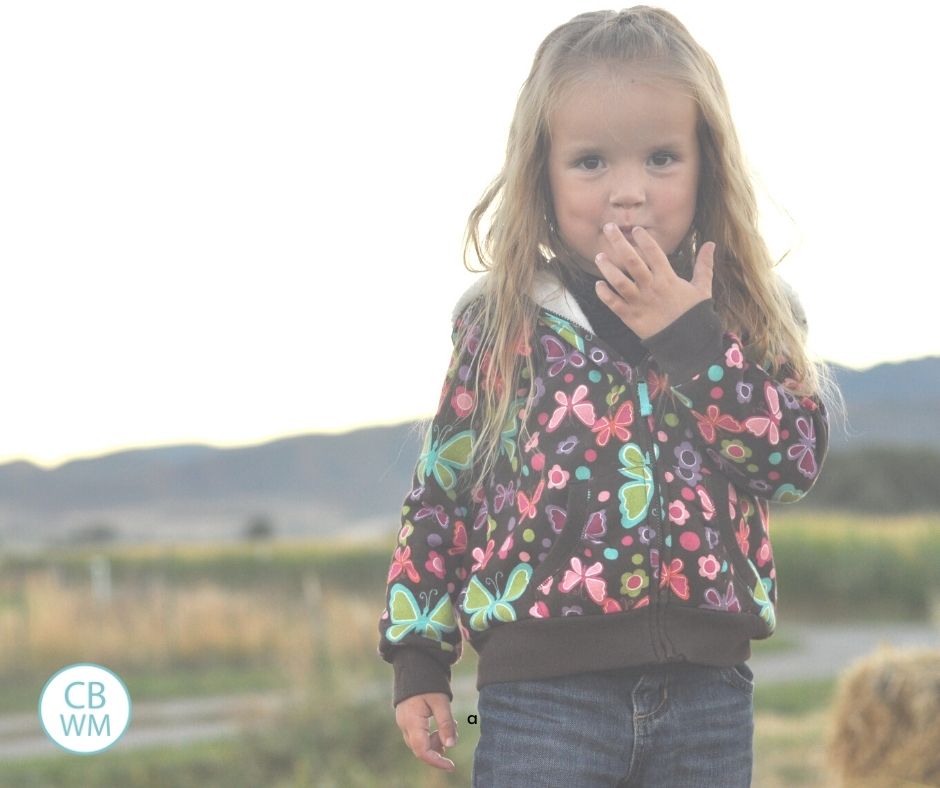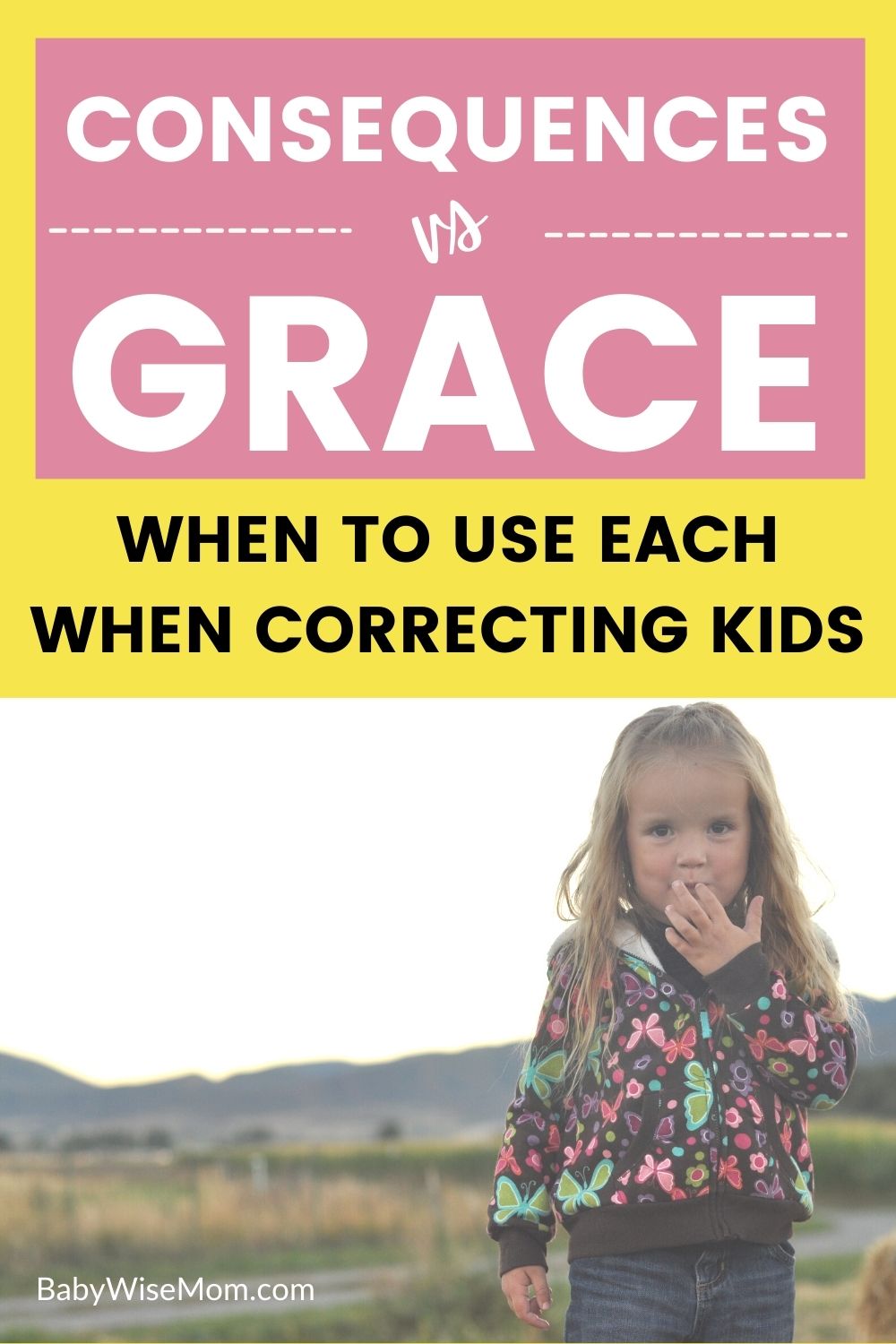When your child makes a mistake or disobeys, should you always apply natural or logical consequences or should you use grace? Find out in this post.

One of the swiftest ways to get your child to change behavior is to have consequences in place and to stick to those consequences.
Consequences teach children very quickly.
If x, then y. If you don’t want y, don’t do x.
It seems simple when you think about it in black and white, but when you are living that idea in real life, sometimes applying consequences seems harsh. Sometimes it is harsh.
As much as we want to raise responsible children who follow rules and take care of themselves, we also want to raise children who are kind, thoughtful, and loving.
We want our children to offer grace to others. In order to be able to show grace, they need to have seen what grace is in action. Here are some examples when we can and should show grace.
Post Contents
When There Are High Emotions
Sometimes your child is having a bad day or feels super intense about something. Your child might lash out at you or another child.
Grace can be offered here as you sit and talk with your child about the situation rather than simply swooping in with the consequence. These are good learning moments if you address it with patience and kindness.
In situations like this, you can offer grace while still having a consequence for actions.
You might lessen the consequence or even change the consequences. You can be guided in knowing how much to lessen consequences here by the remorse your child shows. I am sure there have been times in your recent history when you have reacted emotionally and regretted it.
Show the grace you would like shown to you.
We all know it is much harder to be kind, patient, and pleasant when we are emotional. Even adults struggle with it.
We want to show our children some grace in these moments, but we also want to teach them that being emotional doesn’t make it okay to be unkind toward others. There are still consequences for the things we do and say even if we are emotional.
When The Child is Hungry or Tired
Hungry and tired children often make poor decisions–just like hungry and tired adults do!
This is especially true for toddlers and preschoolers.
Sometimes if I have a cranky toddler or young preschooler, I will change up a typical consequence and just get the child into bed or get food into her.
I have had two children who have a very hard time keeping emotions in check as preschoolers when hungry. As soon as they had food, they were both their normal, sweet selves.
So when a tantrum started and it was close to mealtime, I would feed first and see how the attitude followed.
As my kids get older, I start to expect them to be able to control their emotions and attitude even if they are hungry or tired. I will offer a reminder of the need to still be kind even when hungry or tired before offering a consequence for bad attitude.
When the Child is Stressed
When life changes, children can become forgetful. When my children start school, there are often times they forget a homework folder or backback somewhere between school and home.
I understand the child is stressed on some level with this new life change and having to learn to keep track of things they haven’t had to keep track of before. I offer grace and do what we can to remedy the situation.
I like my children to learn to keep track of their own items and be independent and personally responsible. I don’t often bail my child out. This has proven to serve my children well as my teenagers take personal responsibility for their school work and life in general.
BUT we all make mistakes. We all forget things sometimes. Those are times to bail out as we can. What you want to avoid is creating patterns and/or general laziness.
When It is a First-Time or Rare Offense
A big challenge in this area parents face is around school. If the child forgets homework, do you bring it to her at school? If she leaves her packed lunch on the counter, do you run it to school or have her eat school lunch?
Children can forget shoes, library books, jackets, and more on either side of school.
Brayden and Kaitlyn both had some forgetful moments as Kindergartners. McKenna never did as a Kindergartner, which really shocked me. In first grade, however, she forgot her homework folder at school. Being a first-time situation, we went to school early the next day so she could do her homework and I could sign it off.
A couple of weeks later, she forgot again. Once again I went to school with her early the next day. This is a rare thing for her after all and first grade is a big transition since it is the first year of full-day school for us.
Shortly thereafter, she forgot again and her teacher called me and I went to the school to pick it up. All along I had been telling her that I would help her out, but if it became a habit, I would stop helping her. On this third occurrence, I explained that if she forgot again, she was going to have to go to school without her homework done.
It isn’t a huge deal–she just would need to work faster through her morning work to do her last night’s homework and her morning self-starts in the time allotted. She also wouldn’t get a stamp that day for bringing her homework back. But she doesn’t want to go to school unprepared, so it is a consequence that works well.
The day came that she forgot again. She begged me to go to the school early “this one last time.” I reminded her of what I had told her all along. I reminded her that I wouldn’t be doing it again.
She still begged and persisted. I explained to her that she needed to learn to be responsible for her things and for making sure her homework made it home. I explained I would rather her go to first grade with her homework undone than to high school. I assured her she would be sure to remember now that she didn’t have that safety net to save her.
She did not forget again.
So grace is great initially, but at some point, she needs to learn responsibility. I could have taught her that responsibility earlier by not going in earlier the first time. She probably wouldn’t have taken four times then. But she also wouldn’t have learned that mom is there for her and willing to help her out.
She also learned I love her enough to not help her at certain moments in order to help her long-term.
Grace can be applied even when the child is older and has learned the lesson. One morning when Brayden was in fifth grade, Brayden called me. He had forgotten his homework folder at home. I took it to him. It was the first time in years he had forgotten. Grace was applied.
There was also a day in high school when he forgot his swim gear and swim team was right after school. Again, grace applied.
In the book Parenting with Love and Logic, they talk about the benefits of allowing your child to fail while the stakes are low.
Just as I told McKenna, it is better to go to school without your homework done as a first grader than as a tenth grader. Let your kiddos learn the hard lesson when they are younger so they have developed good habits for when they are older.
When the Child Doesn’t Know Better
Many things seem obvious to us as adults, but children don’t always inherently know rules.
If you haven’t taught your child something, it might be good to offer grace and interfere with natural consequences that might otherwise follow.
Here is a simple example.
Your child might be on the monkey bars at the playground calling for your help. A natural consequence to teach your child that the monkey bars are not age-appropriate could be to let the child drop alone (I don’t recommend this for a first-timer or a child who can’t drop without getting hurt).
Applying grace would be you helping the child down and explaining to either not do monkey bars at all at his age or to only do them if he has asked you first.
Another example can be with coloring. Your child might be coloring nicely, then decide the table would look nice colored, also.
A logical consequence for coloring on the table would be to take away art privileges for a period of time. If you haven’t taught your child to not color on the table, however, it is a good moment to teach your child that isn’t okay and offer some grace.
See Teach Kids What Obedience Looks Like for more help on this.
How Do You Decide Which is Right?
When deciding which is right–grace or consequence–you really are often going with your gut. If any of the above factors are in play, you can err on the side of grace.
I am a big believer in consequences and follow through, but you aren’t running a business or a school; you are running a family. You are raising humans. It is okay to show humanity and allow humanity.
What you want to be careful of is not offering idle threats. When your child is obviously tired and needs a nap, you might not apply a consequence for yelling at you.
But do not, in that moment, say, “If you yell at me again, you will not get to do xyz after nap” unless you intend to follow that through. Don’t give the threat and then later make excuses (oh, she was just tired then. It’s okay if she does xyz).
When your child is living a moment above, be very cautious about what you say in those moments.
Offer yourself grace in these situations, also. You might find one day that you have been letting things slide more than is beneficial for your child. You might realize one day you have been too harsh and need to offer more grace.
Don’t beat yourself up. You deserve grace in this process, also.
Related Posts
- Benefits of Teaching Consequences
- Commanding Obedience within Reason
- How to Quickly Think of a Logical Consequence for Kids
- Consequences: Natural VS Logical and How to Use Each
- 10 Guidelines for Using Logical Consequences
- Parenting With Love and Logic: Everything You Need to Know
- All The Help Parents Need for Consequences
- Benefits of Teaching Kids to Deal With Consequences

This post first appeared on this blog in February 2016.

